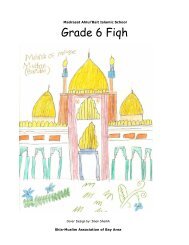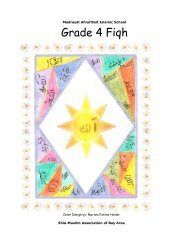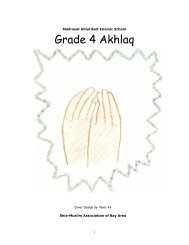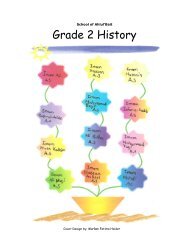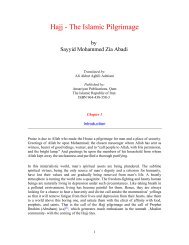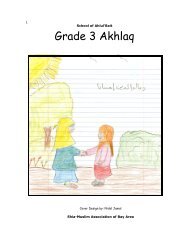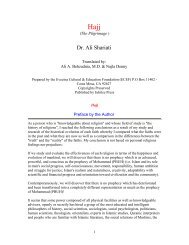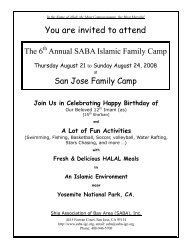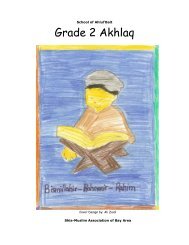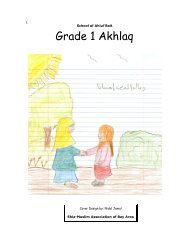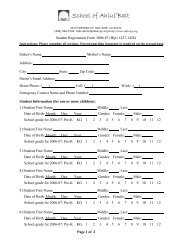Grade 3 Fiqh Book (PDF) - Shia Multimedia
Grade 3 Fiqh Book (PDF) - Shia Multimedia
Grade 3 Fiqh Book (PDF) - Shia Multimedia
Create successful ePaper yourself
Turn your PDF publications into a flip-book with our unique Google optimized e-Paper software.
Madrasat Ahlul’Bait Islamic School<br />
<strong>Grade</strong> 3 <strong>Fiqh</strong><br />
Cover Design by: Sarah Hussain<br />
<strong>Shia</strong>-Muslim Association of Bay Area
First Edition (Revision 2.0)<br />
First Printing May, 2005<br />
Second Printing February, 2006<br />
Compilers and Co-Authors:<br />
Samina Ali, Member, Syllabus Committee,<br />
Madrasat Ahlul’Bait, <strong>Shia</strong>-Muslim Association of Bay Area<br />
Editors:<br />
Samina Ali, Member, Syllabus Committee,<br />
Madrasat Ahlul’Bait, <strong>Shia</strong>-Muslim Association of Bay Area<br />
Copyright Free & Non-Profit Notice:<br />
Madrasat Ahlul’Bait curriculum material can be freely copied, duplicated, reproduced, quoted,<br />
distributed, printed, used in derivative works and saved on any media and platform for non-profit<br />
and educational purposes only. A fee no higher than the cost of copying may be charged for the<br />
material.<br />
Note from Madrasat Ahlul’Bait:<br />
The Publishers and the Authors have made every effort to present the Quranic verses, prophetic<br />
and masomeen traditions, their explanations and the material from the sources referenced in an<br />
accurate, complete and clear manner. We ask for forgiveness from Allah (SWT) and the readers if<br />
any mistakes have been overlooked during the review process.<br />
Contact Information:<br />
Any correspondence related to this publication and all notations of errors or omissions should be<br />
addressed to Syllabus Committee, Madrasat Ahlul’Bait, <strong>Shia</strong>-Muslim Association of Bay Area at<br />
saba@saba-igc.org.<br />
Published by:<br />
Madrasat Ahlul’Bait<br />
<strong>Shia</strong>-Muslim Association of Bay Area<br />
4415 Fortran Court, San Jose, CA 95134, USA<br />
www.saba-igc.org<br />
saba@saba-igc.org<br />
LIMIT OF LIABILITY/DISCLAIMER OF WARRANTY: THE PUBLISHER AND THE AUTHORS MAKE NO REPRESENTATIONS<br />
OR WARRANTIES WITH RESPECT TO THE ACCURACY OR COMPLETENESS OF THE CONTENTS OF THIS WORK AND<br />
SPECIFICALLY DISCLAIM ALL WARRANTIES, INCLUDING WITHOUT LIMITATION WARRANTIES OF FITNESS FOR A<br />
PARTICULAR PURPOSE. NO WARRANTY MAY BE CREATED OR EXTENDED BY SALES OR PROMOTIONAL MATERIALS.<br />
THE ADVICE AND STRATEGIES CONTAINED HEREIN MAY NOT BE SUITABLE FOR EVERY SITUATION. NEITHER THE<br />
PUBLISHER NOT THE AUTHORS SHALL BE LIABLE FOR DAMAGES ARISING HEREFROM. THE FACT THAT AN<br />
ORGANIZATION, BOOK OR WEBSITE IS REFERRED TO IN THIS WORK AS A CITATION AND/OR A POTENTIAL SOURCE<br />
OF FURTHER INFORMATION DOES NOT MEAN THAT THE AUTHORS OR THE PUBLISHER ENDORSES THE<br />
INFORMATION THE ORGANIZATION OR WEBSITE MAY PROVIDE OR RECOMMENDATIONS IT MAY MAKE. FURTHER,<br />
READERS SHOULD BE AWARE THAT BOOKS AND INTERNET WEBSITES LISTED IN THIS WORK MAY HAVE CHANGED<br />
OR DISAPPEARED BETWEEN WHEN THIS WORK WAS WRITTEN AND WHEN IT IS READ. SHIA ASSOCIATION OF BAY<br />
AREA IS NOT ASSOCIATED WITH ANY ORGANIZATION, PRODUCT OR VENDOR MENTIONED IN THIS BOOK.<br />
2 <strong>Grade</strong> 3 <strong>Fiqh</strong>
Table of Contents<br />
Table of Contents ...........................................................................................................3<br />
Foreword ........................................................................................................................5<br />
Preface............................................................................................................................6<br />
Section I: Islamic Beliefs (<strong>Fiqh</strong>) ....................................................................................7<br />
Chapter 1: Furoo-e-Deen ...............................................................................................8<br />
1.1 There are Ten Furoo-e-deen.................................................................................................8<br />
1.2 Worksheet: Furoo—e-Deen .................................................................................................9<br />
Chapter 2: Submission to Allah (swt)..........................................................................10<br />
2.1 Worksheet: Submission to Allah (swt)...............................................................................11<br />
Chapter 3: Asma-ul-Husna...........................................................................................14<br />
3.1 Worksheet: Asma-ul-Husna ...............................................................................................15<br />
Chapter 4: Concept of Sin............................................................................................17<br />
4.1 Worksheet: Concept of Sin. ...............................................................................................19<br />
Chapter 5: Shareeah .....................................................................................................20<br />
5.1 Worksheet: Shareeah..........................................................................................................23<br />
Chapter 6: Islamic Terminology and its Explanations.................................................24<br />
6.1 Wajib ..................................................................................................................................24<br />
6.2 Sunnat.................................................................................................................................25<br />
6.3 Haraam ...............................................................................................................................26<br />
6.4 Makruh ...............................................................................................................................27<br />
6.5 Mubah.................................................................................................................................28<br />
6.6 Muslim ...............................................................................................................................29<br />
6.7 Mu’min...............................................................................................................................29<br />
6.8 Zahid...................................................................................................................................30<br />
6.9 Muttaqi ...............................................................................................................................30<br />
6.10 Kaafir..................................................................................................................................31<br />
6.11 Mushrik ..............................................................................................................................31<br />
6.12 Munaafiq ............................................................................................................................32<br />
6.13 Faasiq .................................................................................................................................32<br />
6.14 Worksheet: Islamic Terminology and its Explanations .....................................................33<br />
Chapter 7: Ritual Purity: Wudhu .................................................................................37<br />
7.1 Conditions of Wudhu .........................................................................................................38<br />
7.2 How to Perform Wudhoo ...................................................................................................39<br />
7.2.1 Wajib and Sunnat Actions..............................................................................................39<br />
7.2.2 Step-by-Step Explanation of How to Perform Wudhoo.................................................40<br />
7.3 Things That Make Wudhu Baatil .......................................................................................42<br />
7.4 Worksheet: Wudhu.............................................................................................................43<br />
Chapter 8: Adhaan and Iqamah....................................................................................46<br />
8.1 Recommendation for Adhaan and Iqamah:........................................................................46<br />
8.2 Cases Where Adhaan and Iqamah are Not Needed:...........................................................46<br />
8.3 Conditions for Adhaan and Iqamah: ..................................................................................46<br />
8.4 Adhaan and Iqamah with Translation ................................................................................47<br />
8.5 Worksheet: Adhaan and Iqamah ........................................................................................48<br />
<strong>Grade</strong> 3 <strong>Fiqh</strong> 3
Chapter 9: Actions of Salaat ........................................................................................49<br />
9.1 Boys:...................................................................................................................................49<br />
9.2 Girls:...................................................................................................................................49<br />
9.3 Practical:.............................................................................................................................50<br />
Chapter 10: Salaat – Timing ........................................................................................51<br />
10.1 Timings of Each Salaat. .....................................................................................................52<br />
10.2 The Time of Salaat (Fazilat and Qadha) ............................................................................53<br />
10.3 Worksheet: Salaat Timings ................................................................................................54<br />
Chapter 11: Salat – The Dress for Prayer ....................................................................55<br />
11.1 Worksheet: Salaat – The Dress for Prayer .........................................................................56<br />
Chapter 12: How to Pray Salaat...................................................................................57<br />
12.1 This is How I Pray Salaat...................................................................................................57<br />
12.2 Worksheet: How to Pray Salaat .........................................................................................69<br />
Chapter 13: Eid-ul-Fitr.................................................................................................72<br />
13.1 Worksheet: Eid-ul-Fitr .......................................................................................................73<br />
Chapter 14: Furoo-e-Deen - Zakat...............................................................................75<br />
14.1 Worksheet: Zakat ...............................................................................................................76<br />
Chapter 15: Furoo-e-Deen – Khums............................................................................77<br />
15.1 Worksheet – Khums (One-Fifth of Your Savings) ............................................................79<br />
Chapter 16: Furoo-e-Deen - Amr bil Ma'roof (Guide others to the Good) ................81<br />
16.1 Work sheet: Amr Bil Ma’roof............................................................................................83<br />
Chapter 17: Hijab, a Means to Modesty ......................................................................84<br />
17.1 Manners of Dressing ..........................................................................................................84<br />
17.2 A Woman’s Scarf ...............................................................................................................84<br />
17.3 Some Points on Clothing and Accessories.........................................................................85<br />
17.4 Hijab as a Way of Life .......................................................................................................85<br />
Chapter 18: Imam Muhammad Al Mahdi (a) ..............................................................87<br />
18.1 How Do Believers Benefit From Imam in Ghaybah? ........................................................88<br />
18.2 Stories When Imam Mahdi (a) Came to Help....................................................................89<br />
18.3 Worksheet: Imam al-Mahdi (a) ..........................................................................................90<br />
SECTION II: Special Occasions..................................................................................91<br />
Chapter 19: The Month of Ramadhan and its Significance.........................................92<br />
19.1 The Holy Qur’an on Ramadhan .........................................................................................92<br />
19.2 Some Hadiths on Ramadhan ..............................................................................................92<br />
19.3 Meaning and Blessings of Sawm (Fasting):.......................................................................93<br />
19.4 Worksheet: Sawm (fasting)................................................................................................95<br />
Chapter 20: Fasting and its Benefits ............................................................................97<br />
20.1 Benefits of Fasting .............................................................................................................98<br />
20.2 Worksheet: Fasting and its Benefits.................................................................................100<br />
Chapter 21: Hajj .........................................................................................................103<br />
21.1 Conditions for Hajj...........................................................................................................103<br />
21.2 Meaning Of Istita-ah ........................................................................................................103<br />
21.3 What to Do Before Going for Hajj...................................................................................104<br />
21.4 Wajibats of Hajj ...............................................................................................................105<br />
21.5 Worksheet: Hajj................................................................................................................106<br />
Acknowledgements....................................................................................................108<br />
4 <strong>Grade</strong> 3 <strong>Fiqh</strong>
In the Name of Allah the Most Gracious Most Merciful<br />
Foreword<br />
The material presented in this document is a result of an effort made by the<br />
personnel of the school of Ahlul’Bait of the <strong>Shia</strong>-Muslim Association of Bay Area<br />
Islamic Center at San Jose, California in cooperation with several schools of<br />
Ahlul’Bait at London-Stanmore, London-Hujjat, Vancouver, Minnesota and Toronto.<br />
We, at San Jose, looked at material from London-Stanmore, London-Hujjat,<br />
Vancouver, Minnesota, Toronto and Irvine's Islamic institutions, as well as that<br />
available at various web-sites to compile age appropriate textbooks for use by our<br />
students. We thank the institutions that were kind enough to provide us with the<br />
electronic files of their curriculum. We used some of what they had and added to it<br />
what we felt was appropriate. We included more worksheets and pictures where<br />
deemed necessary. We also added some new topics that, we felt are important to<br />
the students.<br />
We had two important goals in mind while working on this document. First, introduce<br />
the students to the important Islamic concepts and beliefs that are crucial for him/her<br />
to know. Second, expose the students to as many Quranic verses and sayings from<br />
Prophet Muhammad (p) and his Ahlul’Bait (a) as possible.<br />
We thank Hujjatul Islam Maulana Nabi Raza Abidi for his spiritual guidance. We hope<br />
future efforts will continue taking place until reaching our goal of having a strong, rich<br />
and unified curriculum for the schools of Ahlul’Bait for all ages.<br />
Syllabus Committee<br />
Madrasat Ahlul’Bait<br />
<strong>Grade</strong> 3 <strong>Fiqh</strong> 5
Preface<br />
In this book, Furoo-e-Deen are introduced to the students along with the concepts of<br />
submission to Allah (swt), sin, shareeah and Hijaab. A chapter is also dedicated to<br />
the basic Islamic terminology and its meanings. In Furoo-e-Deen the topics of Salaat,<br />
Zakat, Khums and Amar bil Ma’roof are studied in detail and the students are also<br />
introduced to Fasting and Hajj. A chapter on the awareness of how we benefit from<br />
our living Imam (a) is also included.<br />
6 <strong>Grade</strong> 3 <strong>Fiqh</strong>
Section I: Islamic Beliefs (<strong>Fiqh</strong>)<br />
<strong>Grade</strong> 3 <strong>Fiqh</strong> 7
Chapter 1: Furoo-e-Deen<br />
Furoo-e-deen are the branches of religion.<br />
We as Muslims do these acts of worship when we have understood the roots of<br />
religion which are Usool-e-deen.<br />
1.1 There are Ten Furoo-e-deen<br />
1. Salaat (Daily prayers)<br />
2. Sawm (Fasting)<br />
3. Haj (Go to Mecca on pilgrimage)<br />
4. Zakaat (Charity on certain items given to needy muslims)<br />
5. Khums (Give away one-fifth of your savings)<br />
6. Jihad (To fight in the way of Allah)<br />
7. Amr bil Ma'roof (Guide others to do good)<br />
8. Nahy ‘anil Munkar (Stop others from doing evil)<br />
9. Tawalla (To love and follow the teachings of the 14 masumeen)<br />
10. Tabarra (To keep away from people who do not love or follow<br />
the teachings of the 14 masumeen)<br />
8 <strong>Grade</strong> 3 <strong>Fiqh</strong>
1.2 Worksheet: Furoo—e-Deen<br />
Haj<br />
Amr bil Ma'roof<br />
Zakaat<br />
Khums<br />
Salaat<br />
Jihaad<br />
Tawalla<br />
Nahi ‘anil Munkar<br />
Tabarra<br />
1. Fasting during the Month of<br />
Ramadhan.<br />
2. Give away one-fifth of your<br />
savings.<br />
3. Daily Prayers.<br />
4. Guide others to good.<br />
5. To go to Makka for<br />
pilgrimage.<br />
6. To fight in the way of Allah.<br />
7. To keep away from the<br />
people who do not love or<br />
follow the teachings of the<br />
14 Ma’sumeen (A).<br />
8. Charity on certain items<br />
given to needy muslims.<br />
9. Stop others from doing evil.<br />
10. To love and follow the<br />
teachings of the 14<br />
Ma’sumeen (A).<br />
Sawm<br />
<strong>Grade</strong> 3 <strong>Fiqh</strong> 9
Chapter 2: Submission to Allah (swt)<br />
1. Islam means submission to the will of Allah (i.e total obedience).<br />
2. A Muslim not only accepts Islamic faith but also obeys all the rules and acts<br />
exactly the way recommended in Islam.<br />
3. An example of submission to Allah is that you have to resist everything<br />
prohibited by Allah – like listening to music.<br />
4. True salvation comes from faith along with practice. So you have to believe<br />
in the rules of Islam and act upon your belief.<br />
10 <strong>Grade</strong> 3 <strong>Fiqh</strong>
2.1 Worksheet: Submission to Allah (swt)<br />
Examples of Submission to Allah:<br />
1. When Prophet Muhammad left for Madina I slept on his bed to pretend I was<br />
him. Even though I was endangering my life I was submitting to the will of<br />
Allah to save His Prophet. Who am I?<br />
__________________________________________________________<br />
2. In Karbala, even though I had a much smaller army than the enemies of<br />
Islam I was submitting to the will of Allah and fighting for HAQ (the right<br />
path). Who am I ?<br />
___________________________________________________________<br />
3. I sacrificed my 6 month old son in submission to Allah. Who am I?<br />
____________________________________________________________<br />
4. I ignored disrespect from an old woman (throwing garbage at me) to portray<br />
good Akhlaq of Muslims who submit to Allah. Who am I?<br />
____________________________________________________________<br />
<strong>Grade</strong> 3 <strong>Fiqh</strong> 11
5. I was thrown in fire and in submission to Allah I refused help from angles to<br />
save me. Who am I?<br />
____________________________________________________________<br />
6. I longed desperately to fight Yazid’s army to help my brother but he held me<br />
back. I exercised self control in submission to Allah and His Vali. Who am I?<br />
____________________________________________________________<br />
7. In Sura-e-Dahr … “They give food for the love of Him (Allah), to the poor …<br />
(saying): we feed you for the sake of Allah, we do not want any reward from<br />
you or (even) thanks”. Who are they?<br />
_____________________________________________________________<br />
_____________________________________________________________<br />
_____________________________________________________________<br />
12 <strong>Grade</strong> 3 <strong>Fiqh</strong>
Critical Thinking<br />
What would be true submission to Allah in each of these circumstances?<br />
1. Your non-Muslim friend invites you to his/her house to play. After playing you<br />
are hungry and your friend offers you a juicy (non-halal) hamburger. You are<br />
really curious as to how it tastes and you are afraid of disappointing your friend.<br />
What do you do?<br />
2. Your heard some new swear-words in school. All the ‘cool’ kids use them. You<br />
want to be ‘cool’ too! What do you do?<br />
3. Your mother tells you to finish your homework before watching TV. She then<br />
goes out shopping while you are at home. You really want to watch a 30 minute<br />
program right away but you have 2 hours of homework. What do you do?<br />
4. At lunch time in school your friend offers you some candy with pork gelatin. It<br />
looks tasty and your friend tells you it’s really good. What do you do?<br />
<strong>Grade</strong> 3 <strong>Fiqh</strong> 13
Chapter 3: Asma-ul-Husna<br />
The title Allah is the ideal name for God, all other titles including Rabb, are<br />
attributes or names of God. Imam Ja`fer al-Sadiq (s) has quoted his forefathers<br />
quoting Prophet Muhammad (s.a.w) as saying,<br />
"There are ninety-nine Attributes, one hundred minus one, of Allah; whoever<br />
counts them will enter Paradise."<br />
Allah's various powers are described by His Names or His Attributes.Allah's<br />
Attributes are called Al-Asma-ul Husna, The Beautiful Names.<br />
Almighty Allah does not desire anything from His creation except that He is<br />
worshipped. But Allah cannot be worshipped unless one learns to know Him and<br />
He cannot be known except if He is remembered. This road has been made easy<br />
by Allah Himself. In the Qur'aan He says:<br />
"And to Allah belongs the Beautiful Names, so call upon Him by<br />
these Names."<br />
Prophet Mohammed (s) has said,<br />
"Inspire yourselves with the qualities of Allah."<br />
We will learn the meanings of all 99 names later. In this class we will concentrate<br />
on the names of Rabb, Muhaymin, ‘Azeez, ‘Aadl and Lateef. The meanings are not<br />
absolutely equivalent to their synonyms in Arabic but they are close.<br />
Al Rabb = the Lord and Sustainer<br />
Al Muhaymin = The overall Controller<br />
Al Azeez = The Almighty<br />
Al Aadl = The Just<br />
Al Lateef = The Subtle, the Gentle, the Unfathomable<br />
14 <strong>Grade</strong> 3 <strong>Fiqh</strong>
3.1 Worksheet: Asma-ul-Husna<br />
Explain in your words, why you think that Allah is<br />
1. Al Rabb:<br />
_____________________________________________________________<br />
_____________________________________________________________<br />
_____________________________________________________________<br />
2. Al Muhaymin:<br />
_____________________________________________________________<br />
_____________________________________________________________<br />
_____________________________________________________________<br />
3. Al Azeez:<br />
_____________________________________________________________<br />
_____________________________________________________________<br />
_____________________________________________________________<br />
<strong>Grade</strong> 3 <strong>Fiqh</strong> 15
4. Al Aadil<br />
_____________________________________________________________<br />
_____________________________________________________________<br />
_____________________________________________________________<br />
5. Al Lateef:<br />
_____________________________________________________________<br />
_____________________________________________________________<br />
_____________________________________________________________<br />
16 <strong>Grade</strong> 3 <strong>Fiqh</strong>
Chapter 4: Concept of Sin<br />
A sin is what a person gets for doing a BAD DEED. Think of everything you do as if<br />
it were being marked by Allah. If you do a good deed you get a blessing<br />
(Thawaab), and if you do a bad deed you get a sin (Gunah).<br />
On the day of Judgement (Qiyamat), Allah will see how many "marks" you have. If<br />
you have more Thawaab you will go to Paradise (Jannat) and if you have more<br />
sins you will go to Hell (Jahannum). Only those people who have more Gunah than<br />
Thawaab will go to Jahannum.<br />
Allah explains to us that<br />
Whatever sins you do<br />
whether BIG or (SMALL)<br />
in public or in secret<br />
He knows them all.<br />
Blessing<br />
Sin<br />
He also says that He will forgive those who do Taubah (ask for forgiveness) and<br />
who do not keep on repeating the Gunah.<br />
Two men came to our Sixth Imam (A) saying that they wanted to do Taubah for<br />
their sins. The first man said to Imam (A) that he had done plenty of little sins<br />
(Gunahe Saghira), and the second man said that he had done two very big sins<br />
(Gunahe Kabira).<br />
Imam (A) told the first man to go and pick up one small pebble for each small sin<br />
that he had done. He told the second man to go and pick up two very large<br />
boulders for his two big sins.<br />
After a while the two men came back and asked Imam (A) what to do next. Imam<br />
(A) said that both men should go back and put every single stone back in the same<br />
place where they had found it.<br />
<strong>Grade</strong> 3 <strong>Fiqh</strong> 17
The man with the boulders found it very difficult to lift them and put them back<br />
where he had found them, but he managed to do it.<br />
The man with the small stones did not know where to put the pebbles because he<br />
had so many and could not remember where he had picked all of them.<br />
The moral of this story is that it is very difficult to repent for those sins which are<br />
small but done often.<br />
It is important that we keep doing Taubah and praying that Allah forgives us for our<br />
sins, He is the Most Forgiving and the Most Merciful.<br />
Which sins do you think people commit often?<br />
18 <strong>Grade</strong> 3 <strong>Fiqh</strong>
4.1 Worksheet: Concept of Sin.<br />
Fill in the blanks.<br />
1. A ___________________ is what a person gets for doing a BAD DEED.<br />
2. On the day of___________________, Allah will see how many blessings or<br />
sin a person has.<br />
3. ____________________ means asking Allah for forgiveness.<br />
4. On the Day of Judgment people with more blessings than sins will go to<br />
_______________________.<br />
5. ______________________ is the most forgiving and most merciful.<br />
Allah<br />
Judgment<br />
Taubah<br />
Sin<br />
Jannat<br />
<strong>Grade</strong> 3 <strong>Fiqh</strong> 19
Chapter 5: Shareeah<br />
Religion is a collection of beliefs. It lays down the rules of character, how to deal<br />
with your family members as well as with other people. It also teaches us rules<br />
concerning money matters. They have been taught to us by the Prophets who<br />
were messengers of Allah, sent for the guidance of Mankind. By following the<br />
teachings of true religion, a person becomes happy in this world as well as in the<br />
next one.<br />
The teaching of Islam mainly consists of:<br />
1) Beliefs: To believe in One God, who created this world, the Sun, the<br />
Moon, the Stars, and other planets and everything in them? Because of His<br />
kindness He did not leave human beings without guidance. He sent<br />
Prophets to guide them to the right path so that they may fulfill the duties He<br />
has laid down. Those who follow the teachings of the Prophets would be<br />
successful and happy in this as well as the next world.<br />
2) Character: Islam teaches us to be good and kind to everyone, to love<br />
everyone, to respect parents and teachers, to seek useful knowledge, to<br />
protect our rights and those of others and to live moderately.<br />
3) Social and Economic Guidance: A perfect religion lays down rules<br />
about how to behave and deal with people when they do wrong. It also<br />
teaches us rules about money matters, how one should earn one’s living,<br />
how one should take care of the poor and needy relatives, what type of<br />
business is allowed.<br />
4) Worship: Islam teaches us that we pray to Allah and fast, so that by such<br />
actions we remember Allah and purify our Body and Mind.<br />
We should obey Allah only and not follow people. Allah has created all of us.<br />
Therefore He knows better what is good for us. He has laid down a code of life for<br />
our benefit. Therefore it is in our interest to follow it.<br />
Belief in Islam not only affects a person’s spirit or soul but also his body and action.<br />
20 <strong>Grade</strong> 3 <strong>Fiqh</strong>
A person, who believes in one God, acts differently from a person who does not<br />
believe in God. He who believes in Allah cannot at any time become proud,<br />
because he knows that whatever he has acquired has been given to him by Allah<br />
and Allah can take it back whenever he wishes.<br />
He does not look down upon other people as he knows that all of them have been<br />
created by Allah in the same way as he was created.<br />
He does not bow down before anyone by Allah. He knows that everything has<br />
been created by Allah and he provides for all of our needs. He alone is worthy of<br />
being worshipped.<br />
He also believes in life in the next world and always tries to do well and refrains<br />
from doing bad. The better his deeds, the better will be his life in the next world.<br />
The person who believes in Allah does all the good work even if he is not paid for it<br />
or appreciated by others. He continues to do well to others. He sacrifices his time,<br />
money and energy in serving people for the sake of God, as this pleases God. He<br />
does not become selfish.<br />
Thus belief is connected with character and character with actions. They are all<br />
connected to each other.<br />
A person who does not believe in Allah and life in the next world does not know<br />
who created him, why he was created and what is the purpose of his life. He is like<br />
a traveler who is lost and moves around aimlessly.<br />
When such a person falls into trouble, he has no where to look for help. If he wants<br />
anything, he has no one from whom he can ask to fulfill his wishes.<br />
A person who believes in religion asks for help from Allah when he is in difficulties.<br />
He asks Allah to fulfill his wishes. He is sure that Allah will help him and will grant<br />
him his desires if they are good for him. But a person who does not believe in God<br />
has no one.<br />
<strong>Grade</strong> 3 <strong>Fiqh</strong> 21
A non-believer acts according to his whims. He is most of the time selfish. He is<br />
not prepared to help others for he does not expect to get Allah’s reward for his<br />
sacrifices for the troubles he takes for others.<br />
His only aim in life is to find happiness for him at all cost. He does not know what<br />
the purpose of his life is. He does not hesitate to tell lies, steal, hurt others and do<br />
all sorts of bad things; if these actions will gain something for him. He does not<br />
know that God will punish him for his bad deeds in the next world.<br />
A person who believes in religion is afraid of Allah and will not do bad things. He<br />
knows that any difficulty that comes to him in this world is meant to test his faith in<br />
God. He, therefore, faces it patiently and prays for God’s help. He knows that this<br />
will please Allah and he will be rewarded for it in the next world.<br />
22 <strong>Grade</strong> 3 <strong>Fiqh</strong>
5.1 Worksheet: Shareeah<br />
Fill in the blanks.<br />
1. _____________________is a collection of beliefs.<br />
2. We should obey ________________ only and not follow people.<br />
3. _______________ is like a traveler who is lost and moves around aimlessly.<br />
4. Belief,_______________ and ___________________ are all connected to<br />
each other.<br />
5. Person believing in one God is called_______________________.<br />
Character<br />
Allah<br />
Non believer<br />
Religion<br />
Actions<br />
Believer<br />
<strong>Grade</strong> 3 <strong>Fiqh</strong> 23
Chapter 6: Islamic Terminology and its Explanations<br />
6.1 Wajib<br />
Wajib means compulsory, we must do it. Allah has given us so many blessings. In<br />
return, when He tells us to do something, we must obey Him.<br />
IF YOU DO A<br />
WAJIB ACT<br />
IF YOU DO<br />
NOT DO A<br />
WAJIB ACT<br />
YOU GET<br />
THAWAAB<br />
YOU GET<br />
GUNNAH<br />
Examples of Wajib acts<br />
24 <strong>Grade</strong> 3 <strong>Fiqh</strong>
6.2 Sunnat<br />
A Sunnat act is one that is good to do because it makes Allah happy. However, it is<br />
not Wajib. Every time we find out that the Prophet Muhammad (S) used to do a<br />
certain act, then we should also do it because it is Sunnat.<br />
IF YOU DO A<br />
SUNNAT ACT<br />
IF YOU DO<br />
NOT DO A<br />
SUNNAT ACT<br />
YOU GET<br />
THAWAAB<br />
YOU DON’T GET<br />
GUNNAH<br />
Examples of Sunnat acts<br />
<strong>Grade</strong> 3 <strong>Fiqh</strong> 25
6.3 Haraam<br />
Haraam means forbidden, we must never do it. This is because it makes Allah angry.<br />
IF YOU DO A<br />
HARAAM ACT<br />
IF YOU DO<br />
NOT DO A<br />
HARAAM ACT<br />
YOU GET<br />
GUNNAH<br />
YOU GET<br />
THAWAAB<br />
Examples of Haraam acts<br />
But I have done<br />
my homework!!<br />
No you haven’t!!<br />
Look, you’ve not<br />
filled in all the<br />
26 <strong>Grade</strong> 3 <strong>Fiqh</strong>
6.4 Makruh<br />
A Makruh act is one that we should try not to do because it is not liked by Allah.<br />
However, it is not Haraam.<br />
IF YOU DO A<br />
MAKRUH<br />
ACT<br />
IF YOU DO<br />
NOT DO A<br />
MAKRUH<br />
YOU DON’T<br />
GET GUNNAH<br />
YOU GET<br />
THAWAAB<br />
Examples of Makruh acts<br />
<strong>Grade</strong> 3 <strong>Fiqh</strong> 27
6.5 Mubah<br />
Mubah acts are those that we are allowed to do. Another word for Mubah is Jaiz,<br />
which means allowed. We can get Thawaab for Mubah acts if we do them in the way<br />
Allah likes.<br />
IF YOU DO A<br />
MUBAH ACT<br />
IF YOU DO<br />
NOT DO A<br />
MUBAH ACT<br />
YOU DON’T<br />
GET<br />
YOU DON’T<br />
GET GUNNAH<br />
Examples of Mubah acts<br />
WAJIB<br />
SUNNAT<br />
HARAAM<br />
MAKRUH<br />
MUBAH<br />
– WE MUST DO THEM<br />
– ARE GOOD TO DO THEM AS IT MAKES<br />
ALLAH HAPPY<br />
– WE MUST NEVER DO THEM<br />
– WE SHOULD TRY NOT TO DO THEM<br />
– WE ARE ALLOWED TO DO THEM & WE GET<br />
THAWAAB IF WE DO THEM IN THE WAY ALLAH<br />
LIKES<br />
28 <strong>Grade</strong> 3 <strong>Fiqh</strong>
6.6 Muslim<br />
A Muslim is a person who submits to the will of Allah.<br />
Allah says in the Holy Qur’an (Simplified meaning of Ayat 102, Surah Aali Imraan):<br />
“O people who believe, be aware of all Allah’s laws and respect<br />
them, and always be Muslims.”<br />
I believe in One God, the<br />
Prophets (S) & the Day of<br />
Judgement. I have said and<br />
understand the Kalima<br />
6.7 Mu’min<br />
This is a higher position than a Muslim.<br />
Allah says in the Holy Qur’an (Simplified meaning of Ayat 15, Surah al-Hujaraat):<br />
“The Mu’mins alone are the true believers in Allah and His Prophet.<br />
Once they believe, they never doubt again. They give up their<br />
wealth and even their lives for Allah. They are always truthful.”<br />
I believe in everything that a<br />
Muslim believes in plus in<br />
Justice of God & the 12<br />
Imams (S)<br />
MUSLIM HAS SAID & UNDERSTANDS THE KALIMA AND<br />
BELIEVES IN ONE GOD & DAY OF JUDGEMENT.<br />
MU’MIN BELIEVES IN ALL THAT A MUSLIM DOES AND ALSO<br />
IN THE JUSTICE OF GOD & 12 IMAMS (S)<br />
<strong>Grade</strong> 3 <strong>Fiqh</strong> 29
6.8 Zahid<br />
This is the person who does not love the things of this world too much.<br />
Allah says in the Holy Qur’an (Simplified meaning of Ayat 23, Surah al-Hadeed):<br />
“Do not grieve (too much) at what you missed or rejoice (too much)<br />
at what He has given to you. Allah does not like proud people.”<br />
I am always pleased with whatever<br />
Allah [s.w.t] wills for me. I never<br />
complain to him.<br />
6.9 Muttaqi<br />
This is a person who is pious. This means that he always remembers what Allah’s<br />
wishes are. He never does what Allah has forbidden, and always does what Allah<br />
wants him to do. We should all try to be Muttaqi.<br />
Allah says in the Holy Qur’an (Simplified meaning of Ayat 183, Surah al-Baqarah):<br />
“You should fast so that you become Muttaqi.”<br />
I always remember Allah’s wishes<br />
and never do what Allah has<br />
forbidden. I always do what Allah<br />
wants me to do.<br />
ZAHID IS ALWAYS PLEASED WITH WHATEVER ALLAH WILLS<br />
FOR HIM AND NEVER COMPLAINS<br />
MUTTAQI ALWAYS REMEMBERS WHAT ALLAH’S WISHES ARE.<br />
30 <strong>Grade</strong> 3 <strong>Fiqh</strong>
6.10 Kaafir<br />
This is a person who is not a Muslim.<br />
Allah says in the Holy Qur’an (Simplified meaning of Ayat 161, Surah al-Baqarah):<br />
“The people who are Kaafirs, and die while they remain Kaafirs, are<br />
cursed by Allah, His angels and all mankind.”<br />
I AM A KAAFIR. I DO NOT<br />
BELIEVE IN ONE GOD,<br />
PROPHETS, DAY OF JUDGEMENT<br />
OR 12 IMAMS<br />
6.11 Mushrik<br />
A Mushrik believes that Allah has a partner.<br />
Allah says in the Holy Qur’an (Simplified meaning of Ayat 107, Surah al-An’aam):<br />
“Follow only what has been commanded by Allah, there is no god<br />
except Him, and turn away from the Mushriks.”<br />
I AM A MUSHRIK. I BELIEVE THAT<br />
THERE ARE DIFFERENT GODS FOR<br />
DIFFERENT THINGS. THERE’S A GOD<br />
FOR RAIN, FOOD, MONEY, ETC…<br />
KAAFIR IS A PERSON WHO IS NOT A MUSLIM<br />
MUSHRIK BELIEVES THAT ALLAH HAS A PARTNER<br />
<strong>Grade</strong> 3 <strong>Fiqh</strong> 31
6.12 Munaafiq<br />
A Munaafiq is a person who says that he is a Muslim, but in his heart he does not<br />
follow Islam. He is a hypocrite. Such a person is a liar and makes Allah very angry.<br />
Allah says in the Holy Qur’an (Simplified meaning of Ayat 138, Surah an-Nisaa):<br />
“Inform the Munaafiqs that there will be a painful punishment for<br />
them (in the next world).”<br />
I AM A MUSLIM……..HAH!! HAH!!<br />
HAH!! THAT’S WHAT YOU THINK<br />
RIGHT??<br />
TRUTH IS, I AM NOT. I DON’T PRAY OR<br />
FAST, JUST SAY THAT I AM A MUSLIM<br />
SO THAT PEOPLE THINK OF ME AS A<br />
GOOD PERSON!! HAH! HAH! HAH!!!!!<br />
6.13 Faasiq<br />
This is a person who disobeys Allah openly. He sins in public. A person who defies<br />
Allah in front of everyone is the worst kind of sinner and follows the way of Shaitan.<br />
Allah says in the Holy Qur’an (Simplified meaning of Ayat 40, Surah al-Kahf):<br />
“Allah said to the angels to bow down in front of Aadam, they all<br />
obeyed, except Shaitan. He was a jinn and a Faasiq, and did not<br />
obey the command of his Lord.”<br />
I LOVE TO DO WHAT<br />
I LIKE IN PUBLIC. I<br />
DON’T HIDE IT. I DO<br />
IT WHERE<br />
EVERYBODY CAN<br />
SEE ME!!<br />
THIS IS FUN!!<br />
HAH! HAH! HAH!<br />
MUNAAFIQ IS A PERSON WHO SAYS HE IS A MUSLIM BUT IN HIS<br />
HEART HE DOES NOT FOLLOW ISLAM<br />
FAASIQ IS A PERSON WHO DISOBEYS ALLAH OPENLY<br />
32 <strong>Grade</strong> 3 <strong>Fiqh</strong>
6.14 Worksheet: Islamic Terminology and its<br />
Explanations<br />
Find the right word and circle it:<br />
1. A compulsory act is<br />
a. Sunnat<br />
b. Wajib<br />
c. Haraam<br />
d. Makruh<br />
e. Mubah<br />
2. An act that is good to do because it is good to do and makes Allah happy is<br />
a. Sunnat<br />
b. Wajib<br />
c. Haraam<br />
d. Makruh<br />
e. Mubah<br />
3. An that we should try not to do because it is not liked by Allah is<br />
a. Sunnat<br />
b. Wajib<br />
c. Haraam<br />
d. Makruh<br />
e. Mubah<br />
4. A forbidden act is<br />
a. Sunnat<br />
b. Wajib<br />
c. Haraam<br />
d. Makruh<br />
e. Mubah<br />
5. An act that we are allowed to do is<br />
<strong>Grade</strong> 3 <strong>Fiqh</strong> 33
a. Sunnat<br />
b. Wajib<br />
c. Haraam<br />
d. Makruh<br />
e. Mubah<br />
6. A person who submits to the will of Allah is a<br />
a. Zahid<br />
b. Muslim<br />
c. Mumin<br />
d. Muttaqi<br />
e. Mushrik<br />
f. Kafir<br />
g. Faasiq<br />
h. Munaafiq<br />
7. A person who says that he is a Muslim, but in his heart he does not follow<br />
Islam is a<br />
a. Zahid<br />
b. Muslim<br />
c. Mumin<br />
d. Muttaqi<br />
e. Mushrik<br />
f. Kafir<br />
g. Faasiq<br />
h. Munaafiq<br />
8. A person who is Muslim and believes in Justice of God and the 12 Imams is a<br />
a. Zahid<br />
b. Muslim<br />
c. Mumin<br />
d. Muttaqi<br />
e. Mushrik<br />
f. Kafir<br />
g. Faasiq<br />
h. Munaafiq<br />
34 <strong>Grade</strong> 3 <strong>Fiqh</strong>
9. A person who does not love the things of this world too much is a<br />
a. Zahid<br />
b. Muslim<br />
c. Mumin<br />
d. Muttaqi<br />
e. Mushrik<br />
f. Kafir<br />
g. Faasiq<br />
h. Munaafiq<br />
10. A person who is pious is a<br />
a. Zahid<br />
b. Muslim<br />
c. Mumin<br />
d. Muttaqi<br />
e. Mushrik<br />
f. Kafir<br />
g. Faasiq<br />
h. Munaafiq<br />
11. A person who is not a Muslim is a<br />
a. Zahid<br />
b. Muslim<br />
c. Mumin<br />
d. Muttaqi<br />
e. Mushrik<br />
f. Kafir<br />
g. Faasiq<br />
h. Munaafiq<br />
12. A person who believes that Allah has a partner is a<br />
<strong>Grade</strong> 3 <strong>Fiqh</strong> 35
a. Zahid<br />
b. Muslim<br />
c. Mumin<br />
d. Muttaqi<br />
e. Mushrik<br />
f. Kafir<br />
g. Faasiq<br />
h. Munaafiq<br />
13. A person who disobeys Allah openly is a<br />
a. Zahid<br />
b. Muslim<br />
c. Mumin<br />
d. Muttaqi<br />
e. Mushrik<br />
f. Kafir<br />
g. Faasiq<br />
h. Munaafiq<br />
36 <strong>Grade</strong> 3 <strong>Fiqh</strong>
Chapter 7: Ritual Purity: Wudhu<br />
Wudhu is a special way of washing that makes us spiritually clean. Wudhu is made<br />
up of washing the face and arms, and wiping the front of the head and upper<br />
part of the two feet.<br />
Wudhu is Wajib [required] for:<br />
Wudhu is Sunnat [recommended] for:<br />
<strong>Grade</strong> 3 <strong>Fiqh</strong> 37
7.1 Conditions of Wudhu<br />
I am doing Wudhoo for<br />
the pleasure of Allah,<br />
Qurbatan Ilallah<br />
38 <strong>Grade</strong> 3 <strong>Fiqh</strong>
7.2 How to Perform Wudhoo<br />
7.2.1 Wajib and Sunnat Actions<br />
Wudhoo is divided into<br />
WAJIB ACTIONS<br />
SUNNAT ACTIONS<br />
NIYYAT<br />
WASH<br />
HANDS<br />
WASH<br />
FACE<br />
GARGLE<br />
WASH<br />
ARMS<br />
WASH<br />
NOSE<br />
MASAH OF<br />
HEAD<br />
MASAH OF<br />
FEET<br />
THESE ACTIONS HAVE TO BE<br />
DONE, OTHERWISE WUDHOO IS<br />
WRONG [BATIL]<br />
IF YOU DO THESE ACTIONS YOU<br />
GET THAWAAB, BUT IF NOT DONE<br />
YOUR WUDHOO IS SAHIH [RIGHT]<br />
<strong>Grade</strong> 3 <strong>Fiqh</strong> 39
7.2.2 Step-by-Step Explanation of How to Perform<br />
Wudhoo<br />
While performing wudhoo, it is mustahab to recite du’as during each action.<br />
1. Niyyat - Wajib Action<br />
The first action of wudhoo is Niyyat i.e. you say what you are going to do and for whom. The<br />
niyyat must be of Qurbatan ilallah.<br />
I am doing Wudhoo for the pleasure of Allah,<br />
Qurbatan Ilallah<br />
2. Washing your hands - Sunnat Action<br />
Wash your hands two times<br />
3. Gargling - Sunnat Action<br />
Oh Allah! Please help me speak the truth.<br />
Gargle i.e. wash your mouth three times<br />
4. Washing your nose - Sunnat Action<br />
Oh Allah! Please help me to smell the<br />
fragrance of paradise.<br />
Wash your nose [take water into the nostrils] three times<br />
40 <strong>Grade</strong> 3 <strong>Fiqh</strong>
5. Washing your face - Wajib Action<br />
Oh Allah! Let my face shine<br />
on the day of judgement.<br />
First get some water in your right hand and then pour it onto<br />
your forehead, where the hair grows.<br />
You have to wash the whole length of your face, beginning from your forehead<br />
(where the hair grows) and ending at the bottom of the chin.<br />
You have to wash the whole width of your face. You do this by stretching your<br />
hand out (from your thumb to your middle finger). To make sure that the whole<br />
width has been washed, you should pass your wet hand on either side of your<br />
face.<br />
Washing of the face once is Wajib. It is Mustahab to wash your face twice but<br />
wudhoo becomes batil if washed more than two times<br />
6. Washing your arms - Wajib Action<br />
Oh Allah! Please give<br />
my a’amal in my right<br />
h d<br />
Oh Allah! Please do<br />
not give my a’amal in<br />
my left hand<br />
The washing of the arms is from the elbow to the fingertips. First the right arm<br />
is washed wit the left hand, then the left arm is washed with the right hand.<br />
THE WASHING OF THE ARMS IS A LITTLE DIFFERENT FOR BOYS AND<br />
GIRLS.<br />
BOYS - THE WATER IS POURED ABOVE THE BACK PART OF THE<br />
ELBOW.<br />
GIRLS – THE WATER IS POURED ABOVE THE FRONT PART OF THE<br />
ELBOW.<br />
Washing of the arms once is Wajib. It is Mustahab to wash your arms twice<br />
<strong>Grade</strong> 3 <strong>Fiqh</strong> 41
7. Masah of the head - Wajib Action<br />
Oh Allah! Please decrease<br />
the heat of the sun on the<br />
day of judgement.<br />
This is done by wiping the wet three fingers of the right hand from the middle of<br />
the head up to the edge of the hair, without touching the forehead.<br />
The water of the face and head should not join.<br />
This is done once only.<br />
8. Masah of the feet - Wajib Action<br />
Oh Allah! Please help me<br />
pass pool – e – sirat with ease<br />
This is done by wiping the wet fingers of the right hand over the upper part of<br />
the right foot from the tip of the toes to the ankle.<br />
Then the same is done with the left hand for the left foot.<br />
This is done once to each foot.<br />
7.3 Things That Make Wudhu Baatil<br />
1. Going to the toilet; whether to pass urine or faeces.<br />
2. Passing wind from the rear. (stomach wind)<br />
3. Sleeping.<br />
4. Becoming unconscious.<br />
42 <strong>Grade</strong> 3 <strong>Fiqh</strong>
7.4 Worksheet: Wudhu<br />
Draw a circle round those things that you have to do Wudhu for AND<br />
A square around those things it is good to do Wudhu for.<br />
Before reciting Qur’an<br />
Before going to sleep<br />
Before offering Salaat<br />
Before going to the Mosque<br />
Before Tawaf of Kaa’ba<br />
When you become angry<br />
<strong>Grade</strong> 3 <strong>Fiqh</strong> 43
The following are the Sunnat actions of Wudhu.<br />
Colour them in and write how many times each one has to be done.<br />
__________ times<br />
____________ times.<br />
__________ times.<br />
44 <strong>Grade</strong> 3 <strong>Fiqh</strong>
Following are the Wajib Actions of Wudhu.<br />
Number the Wajib actions of Wudhu to show the right order and then colour them in:<br />
<strong>Grade</strong> 3 <strong>Fiqh</strong> 45
Chapter 8: Adhaan and Iqamah<br />
8.1 Recommendation for Adhaan and Iqamah:<br />
1. Adhaan and iqamah are mustahab (recommended) for the five daily prayers,<br />
whether you are saying that daily prayer as ada or as qadha, at home or while<br />
traveling, in health or in sickness, alone or in a jamaat.<br />
2. It becomes more recommended to say adhaan and iqamah when you are doing<br />
you salat as ada and especially for the Maghrib and Isha prayers.<br />
3. From the two, iqamah is more recommended.<br />
8.2 Cases Where Adhaan and Iqamah are Not Needed:<br />
1. For a person who heard another person saying the Adhaan and Iqamah.<br />
2. For the person who joins a jamaat prayer while Adhaan and Iqamah has<br />
already been said.<br />
8.3 Conditions for Adhaan and Iqamah:<br />
1. Niyyat — the intention in your mind that you are saying the adhaan or<br />
iqamah for the sake of Allah.<br />
2. Tartib — the order should be followed; adhaan should be said before<br />
iqamah and the phrases of adhaan and iqamah should be done in the<br />
correct order as well.<br />
3. Muwalat — there should be continuity between the adhaan and iqamah and<br />
between their phrases.<br />
4. The adhaan and iqamah should be said in Arabic.<br />
5. The adhaan and iqamah should be said after the time of salat has started.<br />
46 <strong>Grade</strong> 3 <strong>Fiqh</strong>
8.4 Adhaan and Iqamah with Translation<br />
Allahu Akbar (4 times in Adhaan / 2 times in Iqamah)<br />
“Allah is the greatest”<br />
Ash hadu an la ilaha illal lah (2 times — Adhaan and Iqamah)<br />
“I bear witness that there is no god but Allah”<br />
Ash hadu anna Muhammadan Rasu lul lah (2 times — Adhaan and<br />
Iqamah)<br />
“I bear witness that Muhammed is the messenger of Allah”<br />
Ash hadu anna Aliyyun Waliyyullah (2 times — Adhaan and Iqamah)<br />
“I bear witness that Ali is the beloved of Allah”<br />
[Not a part of Adhaan or Iqamah but recited to complete the kalema]<br />
Hayya alas Salah (2 times — Adhaan and Iqamah)<br />
“Rush to prayers”<br />
Hayya alal Falah (2 times — Adhaan and Iqamah)<br />
“Rush to success”<br />
Hayya ala Khayril Amal (2 times — Adhaan and Iqamah)<br />
“Rush to the best act (prayer)”<br />
Qadqa matis Salah (2 times — Iqamah only)<br />
“The prayer has begun”<br />
Allahu Akbar (2 times — Adhaan and Iqamah)<br />
“Allah is the greatest”<br />
La ilaha illal lah (2 times in Adhaan / 1 time in Iqamah)<br />
“There is no God but Allah”<br />
<strong>Grade</strong> 3 <strong>Fiqh</strong> 47
8.5 Worksheet: Adhaan and Iqamah<br />
1. If I am praying a qadha prayer, is it still recommended for me to recite<br />
adhaan and iqamah?<br />
_______________________________________________________________<br />
_______________________________________________________________<br />
2. Give on case where adhaan and iqamah is not needed.<br />
_______________________________________________________________<br />
______________________________________________________________<br />
3. Explain three conditions for reciting adhaan and iqamah.<br />
_______________________________________________________________<br />
_______________________________________________________________<br />
4. What phrase do we recite in adhaan and iqamah which is not actually a part<br />
of adhaan and iqamah?<br />
_______________________________________________________________<br />
_______________________________________________________________<br />
5. What does Ash hadu an la ilaha illal lah mean?<br />
_______________________________________________________________<br />
_______________________________________________________________<br />
48 <strong>Grade</strong> 3 <strong>Fiqh</strong>
Chapter 9: Actions of Salaat<br />
9.1 Boys:<br />
Takbiratul Qiyam Ruku Qiyam Sajdah Juloos Sajdah Juloos Ihram<br />
Qiyam Qunoot Ruku Qiyam Sajdah Juloos Sajdah Juloos<br />
9.2 Girls:<br />
Takbiratul Qiyam Ruku Qiyam Sajdah Juloos Sajdah Juloos Ihram<br />
Qiyam Qunoot Ruku Qiyam Sajdah Juloos Sajdah Juloos<br />
<strong>Grade</strong> 3 <strong>Fiqh</strong> 49
9.3 Practical:<br />
Demonstrate praying of four rakaat salaat in your class.<br />
50 <strong>Grade</strong> 3 <strong>Fiqh</strong>
Chapter 10: Salaat – Timing<br />
Allah says in the Holy Qur'an:<br />
Establish Salaat from the declining of the sun till the darkness of the<br />
night and the morning recitation; Surely the morning recitation is<br />
witnessed.<br />
The above verse tells us that the timings of Salaat are:<br />
- When the sun declines - time for Dhohr and 'Asr Salaat<br />
- Darkness at night - time for Maghrib and Eisha Salaat<br />
- The morning recitation time for Fajr Salaat.<br />
Dhohr + ‘Asr Salaat together = Dhohrain Salaat<br />
Maghrib + Eisha Salaat together = Maghribain Salaat<br />
Timing in more detail:<br />
Fajr Salaat:<br />
From True Dawn up to Sunrise.<br />
Dhohrain Salaat:<br />
From Midday Noon up to Sunset.<br />
Maghribain Salaat:<br />
From the time the sun sets (the redness in the sky disappears) up to Midnight.<br />
Although Allah has given us so much time in which to pray we should<br />
try to pray as soon as the time sets in for that Salaat (Fadhilat - best<br />
time), because we can not wait to thank Allah in the way He likes us<br />
to, for all the wonderful things He has given us.<br />
<strong>Grade</strong> 3 <strong>Fiqh</strong> 51
10.1 Timings of Each Salaat.<br />
52 <strong>Grade</strong> 3 <strong>Fiqh</strong>
10.2 The Time of Salaat (Fazilat and Qadha)<br />
It is better to pray in the time of Fazilat, when the prayers are rewarded<br />
with more Thawab.<br />
By regular offering of Salaat at its fixed timings, the spirit of punctuality is developed.<br />
When the time of a Salaat ends, it becomes Qadha. If you have not prayed your<br />
Salaat before it becomes Qadha, you will then pray with the Niyyat of Qadha (rather<br />
than ‘ada’)<br />
THERE ARE SEVERE PUNISHMENTS AND DISADVANTAGES OF DELAYING<br />
THE WAJIB SALAAT, MAKING THEM QADHA OR MISSING THEM<br />
COMPLETELY.<br />
NAME OF SALAAT FAZILAT TIME QADHA TIME<br />
FAJR (Subhu)<br />
DHUHR<br />
Beginning from SUBH-<br />
SADIQ<br />
Beginning from NOON<br />
TIME<br />
SUNRISE<br />
SUNSET<br />
ASR After DHUHR prayer SUNSET<br />
MAGHRIB After SUNSET MIDNIGHT<br />
ISHA After MAGHRIB prayer MIDNIGHT<br />
<strong>Grade</strong> 3 <strong>Fiqh</strong> 53
10.3 Worksheet: Salaat Timings<br />
Write the timings for each Salaat for the whole week:<br />
Mon Tue Wed Thurs Fri Sat Sun<br />
Fajr<br />
Dhohr<br />
Asr<br />
Maghrib<br />
Eisha<br />
Now write the timings when you prayed each Salaat during this week:<br />
Mon Tue Wed Thurs Fri Sat Sun<br />
Fajr<br />
Dhohr<br />
Asr<br />
Maghrib<br />
Eisha<br />
54 <strong>Grade</strong> 3 <strong>Fiqh</strong>
Chapter 11: Salat – The Dress for Prayer<br />
The following condition must be observed in the clothes for Salaat<br />
- The clothes must be TAHIR.<br />
- The clothes must be MUBAH.<br />
- Mubah means that the clothes must be lawfully yours. Either you are<br />
the owner or you have permission to use it.<br />
- A dress bought from money from which Zakaat and Khums has not<br />
been paid, is regarded as GHASBI. Ghasbi is the opposite of Mubah.<br />
So a prayer offered in such clothing is Batil.<br />
- The clothes must not be made from any part of a Haraam animal. Therefore, for<br />
example a coat made of Lion’s hair is not allowed to be worn in Salaat.<br />
- If the clothes are made from any part of a Halaal animal which was slaughtered<br />
in the Islamic way, then there is no problem with it at all.<br />
- If the clothes are made from an Halaal animal which died by itself or was<br />
slaughtered in an un-Islamic way then there are two rules:<br />
- If the clothes are made from those parts of such an animal which have<br />
feeling during lifetime (like, fat, meat, skin, hide), then such clothing are not<br />
allowed in Salaat.<br />
- If the clothes are made from those parts of such an animal which have no<br />
feeling during lifetime (like, hair, horn, teeth, bone, nails), then such clothing<br />
are allowed in Salaat.<br />
FOR MEN ONLY<br />
- The clothes should not be made of gold (whether pure or mixed). Wearing any<br />
gold is Haraam for men at all times, not only during Salaat.<br />
- The clothes should not be made of pure silk. Wearing pure silk is Haraam for<br />
men at all times, not only during Salaat.<br />
<strong>Grade</strong> 3 <strong>Fiqh</strong> 55
11.1 Worksheet: Salaat – The Dress for Prayer<br />
Fill in the blanks<br />
1. The clothes for salat must be ______________ and ___________________.<br />
2. A dress bought from money from which Zakaat and Khums has not been paid,<br />
is regarded as ____________________.<br />
3. Wearing any ___________is Haraam for men at all times, not only during<br />
Salaat.<br />
4. _____________means that the clothes must be lawfully owned. Either a person<br />
is the owner or have permission to use it.<br />
5. The clothes must not be made from any part of a ________________ animal.<br />
6. Wearing pure ___________ is haram for men at all times.<br />
Silk mubah tahir<br />
Ghasbi<br />
gold<br />
Haram<br />
56 <strong>Grade</strong> 3 <strong>Fiqh</strong>
Chapter 12: How to Pray Salaat<br />
12.1 This is How I Pray Salaat<br />
1. NIYYAT<br />
Niyyat means intention to do something. Niyyat is important<br />
because Islam does not want us to pray just out of habit. Islam<br />
wants us to be aware of what we do.<br />
NIYYAT<br />
I say my Niyya. For example, if I am praying Maghrib, I say:<br />
I am praying 3 rakaats for Maghrib Salaat, Qurbatan illallaah.<br />
This means to obey Allah and to get close to<br />
Him.<br />
2. TAKBIRATUL IHRAM<br />
Then I raise my hands up to my ears for Takbiratul Ihram and I<br />
say:<br />
"Allahu Akbar"<br />
This means “Allah is Great”<br />
3. QIYAM<br />
<strong>Grade</strong> 3 <strong>Fiqh</strong> 57
Now I stand still for<br />
Qiyam and looking at<br />
the ground (turbat,<br />
mohr), I recite<br />
Sura al-Hamd<br />
(Fatiha )and one other<br />
sura from the Qur’an.<br />
Surah al-<br />
Hamd<br />
Qiyam means<br />
standing.<br />
Bismilla hir Rahmanir Rahim<br />
In the name of Allah, the Beneficent, the Merciful.<br />
Al hamdu lil lahi Rabbil Alamin.<br />
Praise be to Allah, the Lord of the worlds.<br />
Ar Rahmanir Rahim.<br />
The Beneficent, the Merciful.<br />
Maliki yawmid Din.<br />
Master of the Day of Judgement.<br />
lyyaka na'budu wa iyyaka nasta'in.<br />
You alone we worship, and You alone we ask for help.<br />
Ihdinas Siratal mustaqim.<br />
Guide us on the right path<br />
Siratal ladhina an'amta 'alaihim<br />
- the path of those whom You have favored;<br />
Ghairil maghdhubi 'alaihim waladh Dhaalin.<br />
not (the path) of those who earned Your wrath; nor of those gone astray.<br />
58 <strong>Grade</strong> 3 <strong>Fiqh</strong>
3. QIYAM (continued) Now I recite any other sura from the Qur’an.<br />
Sura Ikhlas<br />
Bismillahir Rahmanir Rahim<br />
In the name of Allah, the Beneficent, the Merciful.<br />
Qul huwallahu Ahad<br />
0 Prophet! Say: Allah is One - the Eternal Being.<br />
Allahus -Samad<br />
Allah is the Sustainer.<br />
Lam yalid walam yulad<br />
He begot none, nor was He begotten.<br />
Walam yakullahu kufuwan ahad<br />
And none in the creation is equal to Him.<br />
<strong>Grade</strong> 3 <strong>Fiqh</strong> 59
4. RUKU’<br />
I go to Ruku’ and looking between my feet,<br />
I recite:<br />
Subhana Rabbi yal ‘Azimi wa bihamdhi<br />
Glory be to my Lord the Great and praise<br />
be on him<br />
60 <strong>Grade</strong> 3 <strong>Fiqh</strong>
5. QIYAM<br />
I get up from Ruku’ for Qiyam and recite:<br />
Then I<br />
recite:<br />
Chapter 1: Sami' Allahu liman hamidah<br />
Allah hears and accepts the praise of one who<br />
praises<br />
<strong>Grade</strong> 3 <strong>Fiqh</strong> 61
6. Sijda<br />
I go down to Sijda making sure that seven<br />
parts of my body touch the ground – My<br />
forehead, two palms, two knees, and the<br />
two tips of my toes.<br />
Subhana Rabbi yal A’la wa bihamdhi<br />
Glory to my Lord, Most High, and praise be on<br />
Him.<br />
62 <strong>Grade</strong> 3 <strong>Fiqh</strong>
7. Juloos<br />
I get up from sijda and looking at my lap, I say:<br />
Astaghfirullaha Rabbi wa atubu ilayh<br />
I seek forgiveness from Allah my Lord, and<br />
I turn to Him in repentance.<br />
Say:<br />
23<br />
<strong>Grade</strong> 3 <strong>Fiqh</strong> 63
8. Second Sijda<br />
9. Juloos: I get up from sijda for Juloos and recite<br />
10. Now I stand up for Qiyam of the second rakaat. As I am<br />
standing up, I say:<br />
Bi haw lillahi wa quwwatihi aqumu wa aqu’d<br />
I stand and sit with the help and strength of<br />
Allah.<br />
11. Qiyam of the second rakaat:<br />
I stand up for Qiyam and recite Sura al-Hamd and Sura Ikhlas<br />
64 <strong>Grade</strong> 3 <strong>Fiqh</strong>
12. Qunoot<br />
I raise my hands for qunoot and recite:<br />
• Rabbana Aatena<br />
• Fiddunya Hassanatan<br />
• Wa fil aahikhirati Hasanatan<br />
• Wa qina Adahban naar<br />
• Alla humma salli ‘ala Muhammadin wa ali Muhammad<br />
• O’ Lord give us<br />
• Good in the world<br />
• And good in the Hereafter<br />
• And protect us from the punishment of the fire<br />
• O Allah! Send Your blessings on Muhammad and his<br />
Ahlul Bayt<br />
<strong>Grade</strong> 3 <strong>Fiqh</strong> 65
13. I then do ruku’ and the two sijda just like I did in the first<br />
rakaat.<br />
14. Juloos: When I sit for juloos after the second sijda, I say<br />
And then recite Tashahud:<br />
TASHAHHUD (bearing witness)<br />
• Ash hadu an la ilaha illal lahu wahdahu la sharika lahu<br />
• Wa Ashhadu anna Muhammadan ‘abdahu<br />
wa Rasuluh<br />
• Alla humma salli ‘ala Muhammadin wa ali Muhammad<br />
• And I testify that there is none worth worshipping except the<br />
Almighty Allah, Who is One and has no partner<br />
• And I testify that Muhammad is His servant and messenger.<br />
• O Allah! Send Your blessings on Muhammad and his progeny<br />
66 <strong>Grade</strong> 3 <strong>Fiqh</strong>
15. Qiyam:<br />
After Tashahud, I stand up for qiyam of third rakat. I recite Tasbihat-e-<br />
Arba’ three times<br />
• Subhanallahi<br />
• wal hamdu lillahi<br />
• wa la ilaha illal lahu<br />
• wallahu Akbar<br />
• Glory be to Allah,<br />
• and all praise is for Him<br />
• and there is no one God except Allah,<br />
• and He is greater than everything and<br />
everyone.<br />
<strong>Grade</strong> 3 <strong>Fiqh</strong> 67
16. The last Juloos:<br />
I finish my third and final rakaat of Maghrib Salaat with<br />
• Ruku’<br />
• Qiyam<br />
• The 2 sijda<br />
• And in the last juloos, I say<br />
• and then I recite tashahud<br />
• and the salaam:<br />
• Assalamu ‘alayka ayyuhan Nabiyyu wa rahmatullahi wa barakatuh<br />
• Assalamu ‘alayna wa ‘ala ‘ibadil lahis salihin<br />
• Assalamu ‘alaykum wa rahmatullahi wa barakatuh.<br />
• Prophet! Allah’s peace, blessings and grace be upon you,<br />
• Allah’s peace be upon us, those offering prayers – and upon all<br />
the pious servants of Allah,<br />
• Allah’s peace, blessings and grace be on you believers.<br />
68 <strong>Grade</strong> 3 <strong>Fiqh</strong>
12.2 Worksheet: How to Pray Salaat<br />
Write down the meaning of the ayat 2 times<br />
1. Bismilla hir Rahmanir Rahim<br />
In the name of Allah, the Beneficent, the Merciful.<br />
1. ___________________________________________<br />
_____________________________________________<br />
2.____________________________________________<br />
_____________________________________________<br />
2. Al hamdu lil lahi Rabbil Alamin.<br />
Praise be to Allah, the Lord of the worlds.<br />
1. ___________________________________________<br />
_____________________________________________<br />
2.____________________________________________<br />
_____________________________________________<br />
3. Ar Rahmanir Rahim.<br />
The Beneficent, the Merciful.<br />
1. ___________________________________________<br />
2._____________________________________________<br />
<strong>Grade</strong> 3 <strong>Fiqh</strong> 69
Work sheet – Sura Ikhlas – Mark the correct meaning of each ayat.<br />
1. Bismillahir Rahmanir Rahim<br />
In the name of Allah, the Beneficent, the Merciful.<br />
0 Prophet! Say: Allah is One - the Eternal Being.<br />
2. Qul huwallahu Ahad<br />
And none in the creation is equal to Him.<br />
0 Prophet! Say: Allah is One - the Eternal Being.<br />
3. Allahus -Samad<br />
Allah is the Sustainer.<br />
He begot none, nor was He begotten.<br />
4. Lam yalid walam yulad<br />
And none in the creation is equal to Him.<br />
He begot none, nor was He begotten.<br />
5. Walam yakullahu kufuwan ahad<br />
He begot none, nor was He begotten.<br />
And none in the creation is equal to Him.<br />
70 <strong>Grade</strong> 3 <strong>Fiqh</strong>
Draw a line and connect the<br />
Salaat Action to its Name.<br />
Juloos<br />
Qunoot<br />
Sijda<br />
Takbeeratul Ihram<br />
Ruku’<br />
Qiyam<br />
31<br />
<strong>Grade</strong> 3 <strong>Fiqh</strong> 71
Chapter 13: Eid-ul-Fitr<br />
Eid ul-Fitr is the first day after the Holy month of Ramadhan. It is on the 1 st of<br />
Shawwaal.<br />
Fitr means to break, and it marks the end of the fasting period.<br />
It is a happy occasion because:<br />
During Ramadhan we are in the<br />
habit of committing few or no sins<br />
We do not have to fast after<br />
Ramadhan because we have no<br />
food to eat like poor people<br />
Through our prayers in Ramadhan,<br />
Allah may have forgiven our sins<br />
Allah has made a Wajib charity of Zakat ul-Fitr for every family at the end of<br />
Ramadhan. This charity helps poor people who do not have the money to feed<br />
themselves.<br />
72 <strong>Grade</strong> 3 <strong>Fiqh</strong>
13.1 Worksheet: Eid-ul-Fitr<br />
Write in each organ what you should NOT do with it, especially while fasting.<br />
<strong>Grade</strong> 3 <strong>Fiqh</strong> 73
74 <strong>Grade</strong> 3 <strong>Fiqh</strong>
Chapter 14: Furoo-e-Deen - Zakat<br />
Suratal Baqarah, ayat 177 (read in class)<br />
In every society there are people who have wealth and there are<br />
also poor people. Such a vast difference in two groups of society<br />
causes<br />
o Jealousy and bitterness and is a source of trouble.<br />
Islam has taken some important steps to make sure that wealth is distributed by<br />
payment of Zakat or poor-tax.<br />
Zakat is wajib for those who earn their livelihood from agriculture and cattle or<br />
where gold and silver is used for making coins. It is a sort of religious tax and<br />
the money obtained from it is spent for the welfare of the poor, the handicapped<br />
and the orphans. Zakat can be spent on the following:<br />
1. Any <strong>Shia</strong> who does not have enough for his expenses for a year.<br />
2. A poor person or a beggar.<br />
3. A person who is authorized to collect and distribute Zakat funds.<br />
4. A Muslim weak in faith in hope that such payment will strengthen his faith.<br />
5. A person unable to pay his debts.<br />
6. Those projects which benefit muslims e.g. building a mosque.<br />
7. Freeing a slave<br />
8. Homeless people who have no financial security.<br />
Zakat is thus a way to bridge the gap between the rich and the poor.<br />
<strong>Grade</strong> 3 <strong>Fiqh</strong> 75
14.1 Worksheet: Zakat<br />
1. Zakat is<br />
Usool e-dien<br />
Furoo-e-deen<br />
2. Zakat is wajib for those who earn their livelihood from<br />
cattle<br />
end of year savings<br />
gold and silver is used for making coins<br />
pearls<br />
agriculture<br />
3. Zakat can be given to a poor person or a beggar.<br />
TRUE<br />
FALSE<br />
4. Zakat is the way to bridge the gap between man and Allah.<br />
TRUE<br />
FALSE<br />
5. Zakat is also known as ____________.<br />
Poor tax<br />
Rich tax<br />
76 <strong>Grade</strong> 3 <strong>Fiqh</strong>
Chapter 15: Furoo-e-Deen – Khums<br />
Khums is a tax used for the spread of Islam.<br />
Khums is to be paid on the following:<br />
1. Savings at the end of the year. After deducting the necessary<br />
expenditures on maintenance of his family, he or she must pay 20%<br />
on the net savings.<br />
2. Mining income<br />
3. If lawful and unlawful wealth gets mixed up.<br />
4. Anything extracted from the sea e.g. pearls<br />
5. Booty (that which is taken by Muslims from the enemy (non-muslims)<br />
in the battlefield.<br />
6. If land is purchased by Kafir e Zimmi (a kafir who lives in an Islamic<br />
country and is under protection of the government), the Muslim will<br />
pay Khums (i.e. 20% of the value received by him for the land).<br />
Khums can be given in kind (items) or cash. The money of Khums<br />
has to be divided into two equal parts.<br />
1. One part, i.e. 1/2 is given to needy Sehme Sadaat (persons from the family of<br />
the Holy Prophet (S)<br />
2. The second part, i.e. 1/2 is given to Sehme Imam, i.e. the Imam of the time. At<br />
present in the Ghaibat of the Imam (A) this part of the Khums has to be given to<br />
most learned and trustworthy Mujtahid. He is Mujtahid whose taqlid we do. With<br />
his permission we use this money for other purposes, like building Mosques,<br />
Madressas, etc.<br />
<strong>Grade</strong> 3 <strong>Fiqh</strong> 77
Division of Khums<br />
20% or one fifth of year’s savings<br />
½ is given to needy Sadaat<br />
(persons from the family of<br />
the Holy Prophet (p) ) and is<br />
called Sehme Sadaat<br />
½ is for our 12 th Imam (a) and<br />
is called Sehme Imam<br />
78 <strong>Grade</strong> 3 <strong>Fiqh</strong>
15.1 Worksheet – Khums (One-Fifth of Your Savings)<br />
Answer the following questions<br />
1. At the end of a<br />
year, you have<br />
saved<br />
$10!!<br />
How much KHUMS do you have to pay?<br />
10 –5 =<br />
<strong>Grade</strong> 3 <strong>Fiqh</strong> 79
2. Khums is to be paid on savings at the end of the year. After deducting the<br />
necessary expenditures on maintenance of his family, he or she must pay<br />
__________________ on the net savings.<br />
3. ZAKAT KHUMS<br />
Has to be paid on Booty (that which is taken by Muslims from the enemy<br />
(non-muslims) in the battlefield.<br />
4. One part of khums i.e. 1/2 is given to needy Sehme ___________________<br />
(persons from the family of the Holy Prophet (S)<br />
5. The second part, i.e. 1/2 is given to Sehme ______________, i.e. the Imam<br />
of the time.<br />
6. Khums is<br />
Usool e-dien<br />
Furoo-e-deen<br />
80 <strong>Grade</strong> 3 <strong>Fiqh</strong>
Chapter 16: Furoo-e-Deen - Amr bil Ma'roof<br />
(Guide others to the Good)<br />
We should encourage a person to do good actions. This is called Amr bil Ma'roof.<br />
One day Imam Hasan and Imam Hussein saw an old man doing wudhu They<br />
saw that the old man was not doing the wudhu correctly. Both brothers<br />
decided to correct the wudhu of that old man, but they faced a problem.<br />
Imam Hasan and Hussein themselves were very young at that time, and the<br />
person whom they wanted to teach the correct way of doing wudhu was an old and<br />
elderly man. They knew that if they corrected his mistake directly, that old man will<br />
fell ashamed; they did not want to hurt his feelings or pride.<br />
So both brothers decided to correct the wudhu of the old man in an indirect way.<br />
Hasan and Hussein approached the old man and said, 'O Shaykh! We have<br />
decided to compete with each in doing wudhu correctly. Would you be kind enough<br />
to be a judge between us?"<br />
Old man: "Of course, children; I will be pleased to judge your wudhu.<br />
Hasan and Hussein performed their wudhu while the old man stood as a judge<br />
over them.<br />
When they finished their wudhu, the old man saw that both had done it in exactly<br />
same manner and without any mistake. He understood why the two grandsons of<br />
the Prophet had made him a judge over them. He said, "You both know how to do<br />
wudhu correctly. It was me who did not know the correct method."<br />
The sons of 'Ali fulfilled their duty of amr bil malr'uf without insulting or<br />
embarrassing the old man.<br />
We can learn the following from this story:<br />
<strong>Grade</strong> 3 <strong>Fiqh</strong> 81
1. We should help to correct the mistakes of others.<br />
2. We should do so in most kind manner.<br />
3. Before correcting others we should be sure of ourselves. You cannot correct<br />
others if you yourself do not know the right thing.<br />
4. Before correcting others, we should, think about the best method of doing so.<br />
5. If someone corrects our mistake, we should be grateful to him or her and try<br />
to change our behavior.<br />
82 <strong>Grade</strong> 3 <strong>Fiqh</strong>
16.1 Work sheet: Amr Bil Ma’roof<br />
What do you think the girl on the prayer mat is telling her friend?<br />
<strong>Grade</strong> 3 <strong>Fiqh</strong> 83
Chapter 17: Hijab, a Means to Modesty<br />
It is commanded in the Holy Qur’an, Chapter Nur<br />
(The Light)) 24:31-<br />
“And say to the believing women that they cast down their looks<br />
and guard their private parts and do not display their ornaments<br />
except what is obvious thereof, and let them wear their head<br />
coverings over their bosoms, and do not display their ornaments<br />
except to their husbands, or to their fathers, or the father of their<br />
husbands, or the sons of their husbands, or their brothers, or their<br />
brother’s sons, or their sister’s sons, or their women, or those<br />
whom their right hand possess, or the male servants not having<br />
need (of want), or the children who have not attained knowledge of<br />
what is hidden of Women.<br />
17.1 Manners of Dressing<br />
According to Islamic Law (Shari’ah), the woman’s entire body is her aurat or her<br />
private area which must be covered except for her face and hands.<br />
Hijab must be observed in front of all non-mehram males, that is, all males whom a<br />
woman would be permitted to marry, according to Islamic Law.<br />
17.2 A Woman’s Scarf<br />
The scarf or head covering, should frame the face in such a manner that it covers all<br />
of the hair, neck and ears (no dangling earrings should be seen.<br />
84 <strong>Grade</strong> 3 <strong>Fiqh</strong>
17.3 Some Points on Clothing and Accessories<br />
• Clothing should not outline nor define the woman’s figure. It should not<br />
expose the skin. Sleeves should reach down to the wrist.<br />
• None of the clothing should be transparent. Loud colors and large prints are<br />
inappropriate when they attract undue attention to the woman.<br />
• Make-up, lipstick, blush, etc is unacceptable around the non-mehrem who<br />
are present or outside one’s home as it enhanced a woman’s natural beauty,<br />
thus attracting attention to her.<br />
• Excessive and glamorous jewelry is highly dislikened.<br />
• A woman should not walk in such a way that brings attention to her.<br />
“And let them not strike their feet so that what they hide of their<br />
ornaments may be known and turn to Allah all of you, O believers!<br />
so that you may be successful” (Holy Qur’an 24:31)<br />
17.4 Hijab as a Way of Life<br />
Hijab comes from the Arabic root letters HJB which literally means to veil, cover or<br />
shelter. It is not only to cover one’s body with clothing but it is also to veil one’s eyes<br />
from unlawful glances and one’s mouth and ears from indecencies. Hijab in fact, is to<br />
behave in a reserved way. Projecting oneself in a flaunting manner contradicts the<br />
concept of hijab.<br />
Modesty should be reflected in the way one carries oneself. The<br />
Holy Prophet Muhammad (peace be upon him) has stated:<br />
“Modesty is the faith which entitles oneself to Heaven”<br />
<strong>Grade</strong> 3 <strong>Fiqh</strong> 85
Worksheet: Hijab, a Means to Modesty<br />
Write a paragraph about Hijab being a way of life.<br />
___________________________________________________________________<br />
___________________________________________________________________<br />
___________________________________________________________________<br />
___________________________________________________________________<br />
___________________________________________________________________<br />
___________________________________________________________________<br />
86 <strong>Grade</strong> 3 <strong>Fiqh</strong>
12<br />
Chapter 18: Imam Muhammad Al Mahdi (a)<br />
Name<br />
Title<br />
: Muhammad bin Hasan (a)<br />
: Al- Mahdi (the guided one),<br />
Al – Hujjat (proof of Allah),<br />
Al – Muntazar (one who awaits the orders of Allah),<br />
Al –Muntazir (one who is awaited),<br />
Saheb-uz- Zamaan (master of the time),<br />
Al – Qaim (the present one).<br />
Kunyat<br />
Birth date<br />
Father<br />
Mother<br />
Martydom<br />
: Abul Qasim.<br />
: Friday, 15th of Sha’ban 255A.H in Samarra<br />
: Imam Hasan Al Askari (a)<br />
: Sayyida Narjis (a)<br />
: Alive MashaAllah and in Ghaybat.<br />
<strong>Grade</strong> 3 <strong>Fiqh</strong> 87
18.1 How Do Believers Benefit From Imam in Ghaybah?<br />
Once the Holy Prophet (s) was talking to his companions about the Imams after him.<br />
He said the last Imam would be the Twelfth Imam whose name and title would be the<br />
same as his. He said the Imam would remain hidden from his followers. At that time<br />
one of his companions, Jabir got up and asked,<br />
“0 Messenger of Allah! Will his followers benefit from him? "Yes,"<br />
replied the Holy Prophet (s). "They will be guided by his light and<br />
benefit from his love and authority, just as people benefit from the<br />
sun even when it is hidden behind the clouds".<br />
Imam al-Mahdi (a) cannot be seen, but he is aware of what they do, and often guides<br />
and helps those who seek his help. Those who have reached a high degree of faith<br />
are sometimes given the chance to see and talk to him. Many believers have met<br />
him during the hajj.<br />
88 <strong>Grade</strong> 3 <strong>Fiqh</strong>
18.2 Stories When Imam Mahdi (a) Came to Help<br />
There was a pious man called Syed Muhammad Jabal Amili who was traveling through the<br />
desert with a caravan of people, when he got lost.<br />
Syed Amili searched and searched for the caravan but could not find them. It became dark as<br />
night set in. He was all alone in the hot desert, tired, hungry and frightened.<br />
He was about to give up and prepare himself for death when he suddenly saw some water. He<br />
went to the water drank some and then did wudhu and offered his Salaat.<br />
After his Salaat he did not have anymore strength and lay there waiting for death.<br />
All of a sudden he saw a person riding a horse getting closer and closer to him.<br />
When the horse rider reached Syed Amili he said Salaam to him and asked him what the<br />
matter was. Syed Amili explained that he had lost his caravan and was hungry.<br />
The rider asked him why then did he not eat the melons that were lying beside him. Syed Amili<br />
asked the rider not to make fun of him as he had searched all over for food.<br />
The rider said he was not joking, and to look behind him. Syed Amili looked and there were<br />
three melons.<br />
The rider then told him to eat one of them and to take the other two with him and pointed out<br />
the direction he was to go in. He also told Syed Amili that at about sunset he would reach a<br />
tent and from there he would be guided to his caravan.<br />
Then the rider disappeared. Syed Amili says that that was when he realised that it was our<br />
12th Imam, Imam Muhammad al-Mahdi (A).<br />
Syed Amili did as he was told and sure enough the next day at sunset he reached the tent and<br />
was directed to his caravan.<br />
Moral:<br />
Although we can not see our 12th Imam (A) he can see us and knows when we are in need of<br />
his help and comes to help us.<br />
<strong>Grade</strong> 3 <strong>Fiqh</strong> 89
18.3 Worksheet: Imam al-Mahdi (a)<br />
Imam al-Mahdi<br />
(a) was born on:<br />
Date:<br />
Month:<br />
Year:<br />
Town:<br />
Country:<br />
90 <strong>Grade</strong> 3 <strong>Fiqh</strong>
SECTION II: Special Occasions<br />
<strong>Grade</strong> 3 <strong>Fiqh</strong> 91
Chapter 19: The Month of Ramadhan and its<br />
Significance<br />
The month of Ramadhan is a very special month for the Muslims. It is a month of<br />
fasting and prayers, a month of worship and sacrifice, and a month of Mercy and<br />
purification. Fasting during the day and praying at night is not easy. But it helps us<br />
become stronger in our faith. It gets us closer to Allah and away from evil thoughts<br />
and deeds. It is a month where we can get rid of all our sins and start afresh.<br />
Ramadhan is also important because it is the month in which the Holy Qur’an was<br />
revealed. It was sent to guide us, and during this month, Muslims try to recite as<br />
much of it as possible. So let us see what the Holy Qur’an and the hadiths have to<br />
say about this very special month.<br />
19.1 The Holy Qur’an on Ramadhan<br />
“The month of Ramadhan is that in which the Qur’an was sent<br />
down, a guidance for mankind, with clear signs of guidance and the<br />
criterion of right and wrong. So everyone of you who is present (at<br />
home) during that month should spend it in fasting . . . Allah<br />
desires ease for you, and He does not desire difficulty for you. And<br />
(He desires) that you complete the period, and glorify Allah for<br />
having guided you, and that you may give thanks.”<br />
- Surah al-Baqarah, Chapter 2, verse 185<br />
19.2 Some Hadiths on Ramadhan<br />
“Ramadhan burns the sins and faults as fire burns wood.”<br />
- Holy Prophet (s)<br />
“Whoever, during this month of Ramadhan, fasts during the day, stands<br />
up in prayer for part of the night, controls his desires and emotions,<br />
92 <strong>Grade</strong> 3 <strong>Fiqh</strong>
controls his tongue, keeps his eyes down, and does not hurt the feelings<br />
of others, will become free of sins as the day he was born.”<br />
- Imam Muhammad al-Baqr (a)<br />
“The day of your fast should not be like other ordinary days. When you<br />
fast, all your senses — eyes, ears, tongues, hands, and feet — must fast<br />
with you.”<br />
- Imam Ja’far as-Sadiq (a)<br />
19.3 Meaning and Blessings of Sawm (Fasting):<br />
Sawm = fasting<br />
Fasting =<br />
not eating or drinking from 'Subhe-Sadiq' (true dawn) to Maghrib time<br />
(just after sunset).<br />
It is Wajib to fast in the month of Ramadhan.<br />
The month of Ramadhan is the Holiest month in the Islamic calendar.<br />
Amongst the blessings of this month are:<br />
1. The Holy Qur'an was revealed to Prophet Muhammad (s).<br />
2. The night of Qadr which is better than a thousand months.<br />
In this month, every action, whether good or bad, carries more weight.<br />
<strong>Grade</strong> 3 <strong>Fiqh</strong> 93
So:<br />
- reciting the Holy Qur'an is good at all times, but more in this month; AND<br />
- lying is an evil at all times, but more in this month.<br />
However, Sawm does not mean just staying hungry and thirsty throughout the day,<br />
but also to stay away from Haraam things as well.<br />
Sawm helps you to:<br />
- Strengthen your willpower.<br />
- Think of the people who are not as lucky as you are.<br />
- Think of Allah more often throughout the day.<br />
- Clean up your digestive system.<br />
- Change the way your life is to become a better Muslim.<br />
94 <strong>Grade</strong> 3 <strong>Fiqh</strong>
19.4 Worksheet: Sawm (fasting)<br />
1. Write each circle what Sawm does for us:<br />
2. Does Sawm mean just staying hungry and thirsty?<br />
Sawm means:<br />
_______________________________________________________<br />
3. From what time to what time do we keep fast?<br />
We fast from:<br />
_______________________________________________________<br />
<strong>Grade</strong> 3 <strong>Fiqh</strong> 95
4. In which month is it Wajib to fast?<br />
It is Wajib to fast in the month of _____________________________.<br />
5. What are the two main blessings of this month?<br />
A: _________________________________________<br />
B: _________________________________________<br />
96 <strong>Grade</strong> 3 <strong>Fiqh</strong>
Chapter 20: Fasting and its Benefits<br />
Fasting is an act of worship prescribed by Allah. To fast means to stay away from<br />
food and drinks, as well as wrong deeds. The fast is like a living thing — it has a<br />
body and a soul. To stay away from food and drinks is the body of the fast. To stay<br />
away from wrong deeds is its soul. If we are not trying hard to be better Muslims by<br />
fasting, our fast will be a body without a soul.<br />
Imam Jafar As-Sadiq (a) has said:<br />
“Your fast day should not be like other ordinary days. When you fast, all<br />
your senses — eyes, ears, tongue, hands and feet — must fast with<br />
you.”<br />
Here is how: Eyes — Keep your eyes off unlawful things and use this special gift of<br />
God for good acts such as reading the Qur'an and Du'as. Ears — Keep away from<br />
hearing unlawful gossip, lies, and music. Tongue — do not tell lies or useless<br />
stories; do not spread rumors or gossip about other persons; and use the power of<br />
speech in spreading the word of Allah. Hands — Do not hurt others by your actions;<br />
instead try to help them as far as you can. Feet — Do not go toward forbidden<br />
places; rather go toward the places where Allah is remembered. Above all, your<br />
heart and mind must be with you in fasting, because the fast, in its real sense, will not<br />
be complete unless your thoughts, your emotions, your actions, and all aspects of<br />
your life become pure and free from impurity.<br />
Fasting takes place from dawn (before sunrise) to dusk (after sunset). Generally,<br />
fasting is a mustahab act of worship. It is especially mustahab during the months of<br />
Rajab and Sha’ban. But during the month of Ramadhan, fasting becomes wajib. It<br />
is in this month, that Muslims all over the world keep their fasts.<br />
<strong>Grade</strong> 3 <strong>Fiqh</strong> 97
20.1 Benefits of Fasting<br />
There are many benefits of fasting. In this lesson we will look at seven of them.<br />
1. Fasting brings us closer to Allah. When we sacrifice our food and<br />
drink, we will obviously find ourselves in hardship. And when we go<br />
through hardship for the sake of Allah, it will naturally bring us closer to<br />
Allah. As a result, when we break our fasts, Allah will be very pleased<br />
with us, and our du’as at that time will be accepted.<br />
2. Fasting teaches us patience. We all need food and water to survive.<br />
To deny ourselves food and water requires a lot of strength and patience.<br />
So when we fast for a whole month in Ramadhan, we build up a lot of<br />
patience. As a result, the next time we forget our lunch boxes at home, it<br />
won’t matter because not only will we have patience, but we will also be<br />
used to not eating during lunch-times.<br />
3. Fasting helps us know how it feels to be poor. There are so many<br />
poor people in the world today who are suffering from hunger because<br />
they do not have enough money to buy food. By fasting ourselves, we<br />
will know how hard it is for these poor people. At least, we can break our<br />
fasts with a nice dinner — they cannot. As a result, fasting encourages<br />
us to help others who are less fortunate than us.<br />
4. Fasting brings about thankfulness to Allah. Many times, we forget<br />
about all the blessings Allah has given us. We take everything for<br />
granted. For example, in a normal day, we go through breakfast, lunch,<br />
and dinner without a thought of where it came from. But by fasting, we<br />
learn the value of a thing as simple as a glass of water. This helps us be<br />
thankful for the favors of Allah<br />
98 <strong>Grade</strong> 3 <strong>Fiqh</strong>
5. Fasting brings about self-control. We already mentioned how fasting<br />
will bring about patience to hunger. For example, if we are fasting we will<br />
not give in to our desire to eat no matter how hungry we are. But fasting<br />
will also bring about self-control in other things. For example, the next<br />
time we feel angry at someone, we will be able to control ourselves and<br />
act in a positive way. This self-control will help us stay away from other<br />
disliked deeds as well.<br />
6. Fasting breaks our pride. No matter how much wealth we have, or how<br />
high our position in life is, every Muslim has to fast in the month of<br />
Ramadhan. In this way, we are similar to all the Muslims around the<br />
world. We also all depend on Allah to provide for us as well.<br />
7. Fasting is good for the health. Let us think of our stomachs as a<br />
machine that works non-stop. We have three meals each day —<br />
breakfast, lunch, and dinner — and in between, we have snacks. Now if<br />
we fast, then at least our stomachs will get some rest. Fasting is also<br />
good, because it gets rid of bad habits such as smoking. If practices<br />
properly, fasting can lead to better health.<br />
Let us pray to Allah to bless us all during the holy month of Ramadhan. May<br />
He accept our fasts, our prayers, and our good deeds? May He forgive us for our<br />
wrong doings and guide us in our lives.<br />
Sources: <strong>Grade</strong> Six Laws Notes from Al-Muntazir Madrassah and Islam for Children by A.V. Denffer.<br />
<strong>Grade</strong> 3 <strong>Fiqh</strong> 99
20.2 Worksheet: Fasting and its Benefits<br />
True or False: Circle either “T” for True or “F” for False.<br />
1. Fasting is an act of worship. T F<br />
2. To stay away from bad deeds is the soul of fasting. T F<br />
3. Fasting takes place from dusk to dawn. T F<br />
4. Fasting is mustahab in Ramadhan. T F<br />
Multiple Choice: Circle the letter of the best answer.<br />
1. How do we fast with our eyes?<br />
a) We try to use our eyes to read the Qur’an and du’as.<br />
b) We try to sleep as much as possible.<br />
c) We keep blinking to give our eyes some rest.<br />
2. How do we fast with our tongues?<br />
a) We don’t eat anything.<br />
b) We don’t tell lies, but rather we try to spread the word of Allah.<br />
c) We don’t stick out our tongues.<br />
3. How does fasting bring about thankfulness to Allah?<br />
100 <strong>Grade</strong> 3 <strong>Fiqh</strong>
a) During our fasts, since we are so hungry, we realize the value of food, and<br />
so when we get it at the end of the day, we will thank Allah for it.<br />
b) We thank our parents for making us dinner at the end of the day.<br />
c) By fasting, we thank Allah for giving us all that He has.<br />
Short Answer Questions: Answer the following questions.<br />
1. What are the seven benefits of fasting that we learnt?<br />
2. How does fasting help us know how it feels to be poor?<br />
<strong>Grade</strong> 3 <strong>Fiqh</strong> 101
3. How is fasting good for the health?<br />
102 <strong>Grade</strong> 3 <strong>Fiqh</strong>
Our Holy Prophet (S) has said:<br />
"Go for Hajj, you will become rich.<br />
Chapter 21: Hajj<br />
The reward for Hajj is Paradise and Umra is compensation for<br />
every sin. Hajj and Umra both take away poverty and sins just as<br />
sandpaper cleans away the rust from the iron. It is a kind of<br />
Jihad.<br />
One who goes out for Hajj or Umra gets a reward and millions of benefits at every<br />
step. Millions of his sins are forgiven and he is rewarded with millions of high grades.<br />
Any penny or pounds he spends in the way of Allah becomes stored with God<br />
multiplied by thousands.''<br />
Hajj is Wajib act, which has to be performed once in a lifetime. When a person<br />
makes an intention for Hajj, he has to be careful not to include any other reasons in<br />
his intention. The Niyyat has to be solely for the pleasure of Allah i.e. Qurbatan<br />
Ilallah.<br />
21.1 Conditions for Hajj<br />
However, there are certain conditions that have to be met before Hajj becomes<br />
Wajib on an individual; these are:<br />
1. Baligh - (reaches adulthood)<br />
2. Aqil - Being sane and sound of mind<br />
3. Istita-ah - (Being capable).<br />
21.2 Meaning Of Istita-ah<br />
1. You should be able to afford the expense of your journey for Hajj and the stay<br />
during Hajj.<br />
<strong>Grade</strong> 3 <strong>Fiqh</strong> 103
2. You must be able to maintain those dependents that have remained at home.<br />
3. When you return, you must have enough means to maintain yourself and your<br />
dependents.<br />
4. The journey to Hajj and returning from it must not involve any danger to either<br />
your life nor your wealth or your family.<br />
5. You must be healthy. If you cannot go due to an illness but all the other<br />
conditions of Hajj are fulfilled then you can send someone on your behalf.<br />
6. You must have enough time to perform all the Wajib acts of Hajj. If you cannot<br />
do so then you have to keep the money aside and go in the following year.<br />
21.3 What to Do Before Going for Hajj<br />
1. Your money is clean; i.e. you have no debts especially Wajib debts like<br />
Khums and Zakat.<br />
2. Your intention is purely for Hajj; i.e. your Niyyat is of Qurbatan Ilallah.<br />
3. You have prepared a Will and given away some Sadaqah for your journey.<br />
104 <strong>Grade</strong> 3 <strong>Fiqh</strong>
21.4 Wajibats of Hajj<br />
WAJIBATS OF HAJJ<br />
UMRA-E-TAMATTU<br />
HAJJ-E-TAMATTU<br />
Performed anytime<br />
between 1st Shawwal<br />
and 8th Zilhaj<br />
Performed from 9th to<br />
13th Zilhaj<br />
NIYYAT, IHRAM &<br />
TALBIYAH<br />
NIYYAT, IHRAM &<br />
TALBIYAH<br />
TAWAF OF KA’ABA<br />
WUQOOF-E-<br />
ARAFAAT<br />
SALAAT-E-<br />
TAWAAF<br />
SAEE<br />
TAQSEER<br />
MUZDALIFAH<br />
MINA<br />
QURBANI<br />
TAQSEER<br />
TAWAAF OF HAJ &<br />
ITS SALAAT<br />
SAEE<br />
TAWAFUN NISA &<br />
ITS SALAAT<br />
MINA<br />
<strong>Grade</strong> 3 <strong>Fiqh</strong> 105
21.5 Worksheet: Hajj<br />
Choose the best answer<br />
1. Hajj is Wajib act, which has to be performed __________in a lifetime.<br />
a. As many as possible.<br />
b. Once<br />
c. Twice<br />
2. Aqil means _________________________.<br />
a. Being sane and sound of mind<br />
b. Very old.<br />
c. A smart person.<br />
3. Hajj-e-Tamattu is performed from 9 th to 13 th ___________________.<br />
a. Ramadhan<br />
b. Muharram<br />
c. Zilhaj<br />
4. Istitah means___________________.<br />
a. Walking around Kaaba.<br />
b. Being capable.<br />
c. Compulsory act.<br />
106 <strong>Grade</strong> 3 <strong>Fiqh</strong>
1. What is the name of this important Event? _____________<br />
2. Where do you have to go? ___________________<br />
3. Give one lesson that you think you might learn from this trip.<br />
<strong>Grade</strong> 3 <strong>Fiqh</strong> 107
Acknowledgements<br />
<strong>Shia</strong>-Muslim Association of Bay Area would like to thank the authors, editors and<br />
reviewers for their contributions to the Madrasat Ahlul’Bait curriculum development<br />
project.<br />
We are especially thankful to Dr. Nabi Raza Abidi for leading the curriculum<br />
committee and providing the motivation and invaluable guidance for the project.<br />
We would like to express our special gratitude to the MAB teachers and staff for<br />
their support and assistance in the development and testing of the curriculum.<br />
SABA is also very thankful to the Islamic organizations and authors whose syllabus<br />
and books were used for the inspiration and creation of this curriculum.<br />
Please remember in your prayers, all the people involved in this project.<br />
108 <strong>Grade</strong> 3 <strong>Fiqh</strong>




